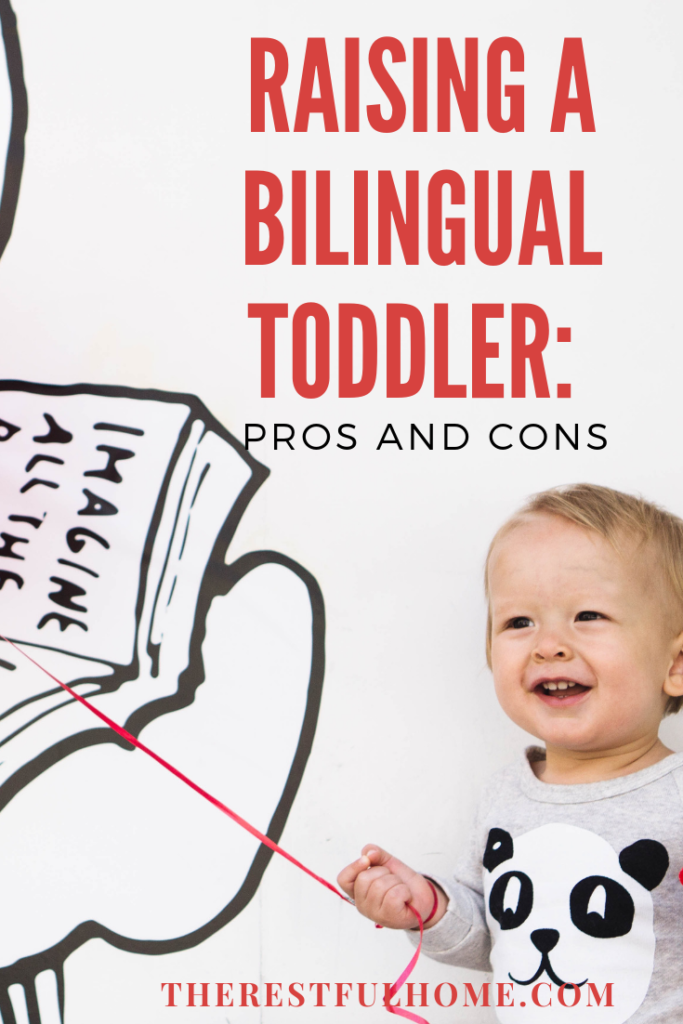
Photo by Alyssa Stevenson. Raising a bilingual toddler: the pros and cons.
Over a year ago, I wrote this article entitled Our Bilingual Baby: An Experiment. In it, I discussed the research about exposing a child to more than one language from birth. I also wrote about some of our goals and some of the questions we had. (For example, I wondered if we would feel too rude to speak Spanish to J when around others who spoke only English.) Now, the baby is a toddler. Our concerns over a year ago have proven to be valid, but so far we are even more encouraged to continue trying to provide a bilingual home for our child. So what are the pros and cons of trying to raise a bilingual toddler in a monolingual environment?
First, the difficulties of having an almost-two-year-old who has heard both English and Spanish his whole short life:
Cons of Having a Bilingual Toddler in a Monolingual Environment:
1. Language acquisition MAY be slower.
This idea is long entrenched, but is now disputed. From our own limited research (i.e. watching our own son), he seems to be behind some children in speech and ahead of others. He can say a number of words (most with his own unique pronunciation) in both languages, but he’s not one of those children who speaks in full sentences by age two. He’s probably a bit behind in both language, but his combined vocabulary is equal to a monolingual child’s vocabulary in one language. (With room for the huge variation among individual children.)
Actually, if your child has a language delay (has not said his first word by age 18 months), researchers now think it’s more likely due to issues other than bilingualism in the home.
Bilingual children vary from one another just as monolingual children do — some will be early and some will be late speakers. But all children whose speech is delayed should be assessed by a doctor and (if necessary) a speech-language practitioner, because if the child is deaf, or if there is some reason for the speech delay, it should be dealt with.
—Anthea Fraser Gupta, Senior Lecturer in Modern English Language, University of Leeds
Rather than actual speech delay, it’s probably more likely that the child may encounter some difficulties as he begins differentiating languages and perhaps wondering which word to use when. He may do something called “code-switching.” In Texas, we call that Spanglish, and it’s perfectly acceptable.
2. If neither parent is fluent in the desired second language, communication difficulties arise.
For example, while potty training I suddenly realized I didn’t know how to say, “Lean forward,” in Spanish. Something so basic, but it’s a command I’ve never needed before. In one of my jobs, I frequently translated for adult students who needed to speak to the director. I never once needed to tell any of them to lean forward. I had to text a friend to get the correct word. (Inclinate or hazte para adelante, if you’re curious.)
3. It can be awkward if you have to give commands or encouragements in the second language when others are around.
As I’ve mentioned previously, I have a family member who resents our speaking Spanish with Little J. I’m not sure why, but I try to mostly just use English around that individual. And with many of our friends, it seems rude to speak Spanish around them since they can’t understand what I’m saying. So I often retire the second language to the backseat. I think this will become more of a problem once J realizes that we don’t actually use Spanish outside the home that much.
4. Figuring out baby words can be quite confusing, since the word could be derived from either language.
I don’t really count this as much of a con. We find it very entertaining to decipher his babble. “Oos” is both “shoes” (zapatos) and “luz” (light) right now; we listen for context or watch where he points.
Pros of Raising a Bilingual Toddler in a Monolingual Environment:
1. Language acquisition doesn’t feel like hard work.
Rather than sitting down with J when he’s twelve and working through a Spanish language textbook, I just chat with him as a small child. He already understands more Spanish than I did after a couple years of studying it in high school. We do fun things together as I chatter, or we read books together and listen to music in both languages. (Here’s a recommended list of resources if you’re like I am and need some help with bringing Spanish and/or other languages into your environment.) Board books in Spanish have been a lifesaver. (Here’s a collection of 21 bilingual board books we love.) Sometimes I stumble as I speak Spanish, since I’m not a native speaker. I make mistakes. But he doesn’t notice, and it feels normal to him that Mommy takes a while to say things sometimes, since he also struggles to express himself with his own very limited vocabulary.
2. It’s a delight to hear your child switch effortlessly from one language to another.
One minute, our child is talking about “balls” and “trucks.” The next, he is showing us his “ojos” (eyes) and “gigo.” (His made-up name for ombligo, the Spanish word for navel.) I can’t tell you how much I love hearing him come up with new words from either language. And I can’t tell you how much I wish I had grown up with a second language being spoken around me. Even if in a terrible American accent.
3. A young toddler isn’t surprised when you switch languages.
More than one word for the same thing? Okay!
The brain cells required for such easy acceptance of Mommy switching back and forth from one language to another? Mind-boggling. However, his lack of surprise doesn’t mean he isn’t differentiating the languages. Some researchers think children begin differentiating languages before they even reach the age of 2.
And yet he will still have to work to learn a third language, because he hasn’t actually learned “how to learn a language” as a teenager or adult learning the language would. He is simply absorbing it.
4. Even if your child doesn’t continue to use the language by choice, she’ll still have a familiarity with it that will help her in the future.
We still have the concern that our son will decide to reject his second language if he perceives little need for it. Thus we will probably push to find a place where he can interact with peers in his second language. And, yes, that’s difficult to do where we live. So if he does reject the language once he’s old enough to realize he doesn’t absolutely need it right now, he will still have a familiarity with it from my speaking it to him throughout his childhood. That will give him a boost once he begins language study in school or when he tries to communicate with people from Spanish languages communities in the future.
Is It Worth All the Work?
Yes, our concerns have proven valid. Speaking a second language when you’re not a native speaker is hard work, and that’s magnified when you’re speaking to someone who can’t talk back. Our environment now is just as monolingual as it was when our son was a small baby.
But we think the pros outweigh the cons. Our world is getting smaller. Bilingual children are already common in Europe, Africa, and many places in Asia, and I believe being bilingual will become not only more common but more often required to obtain jobs by the time my son graduates from college (or whatever he decides to do as an adult). So we will continue to work hard to make a second language part of our family’s everyday life. I will continue trying to potty train, read books, and cook with my son as much in Spanish as I can.
It’s fun having a bilingual toddler, as little as one may still speak. Watching his eyes light in recognition when you ask him, “¿Me traes un libro por favor?” (Will you please bring me a book?) Seeing him happily waddle to the door to close it when you say either, “Close the door,” or “Cierres la puerta.”
If you’re also raising a bilingual toddler, I’d love to hear your advice. And other moms of bilingual kids would love to hear your encouragement. Please comment below!
If you would like to read more about how bilingualism could effect your child in his retention of vocabulary in the majority language, here is an excellent resource:
“Input and Language Development in Bilingually Developing Children.”
If you just want to work on bringing more Spanish into your home, check out these articles:




 : a favorite place to walk when we can!
Once
: a favorite place to walk when we can!
Once 
![The first photos are of my parents’ sprawling rural Arkansas garden. The last is of my tiny little beds in the big city. Plants bring life to even the smallest corner!
I’ve been reading some beautiful fiction this year, and I just posted a review of a book by one of my favorite authors, Leif Enger. (https://therestfulhome.com/brave-young-handsome-review/ in your browser, or click on the link in my Instagram profile) If you don’t have time to read the book, though, here’s just a quote or two for your enjoyment:
🎼
“Death arrived easy as the train; [he] just climbed aboard, like the capable traveler he was.”
🛤️
On riding a horse: “You are a feeble and tenuous being; the only thing a horse wants from you is your absence.” 🐎 😄
#quotes #leifenger #amreading #gardens #gardening](https://scontent-atl3-1.cdninstagram.com/v/t39.30808-6/468657020_18342474787176025_4442629541396867851_n.jpg?_nc_cat=108&ccb=1-7&_nc_sid=18de74&_nc_ohc=DEja6UP2ct4Q7kNvgEYJxCM&_nc_zt=23&_nc_ht=scontent-atl3-1.cdninstagram.com&edm=ANo9K5cEAAAA&_nc_gid=AA4bBsvQ_JpqZXLUPUTpTC8&oh=00_AYCjI9LUx-cJxe6cu0n7H1Gounaz92aBlTrQacnKut8umg&oe=67567CAB)

















Hi… very interesting this blog about raising bilingual babies. I’m going to be a father in the following months… and in my home our native language is Spanish. I can speak English but not as fluent as I would have liked and my wife does not speak it at all. I’m planning to do exactly what you have done…. speak english all time I can to the baby and my wife will speak Spanish. I was wondering if according to my level of English it would be or not a good idea to speak in English to him… but reading you I think I can take my chances. Any advice, I would appreciate a lot.